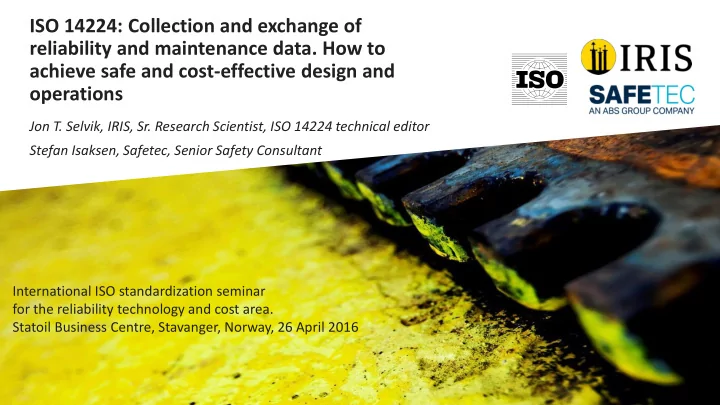

ISO 14224: Collection and exchange of reliability and maintenance data. How to achieve safe and cost-effective design and operations Jon T. Selvik, IRIS, Sr. Research Scientist, ISO 14224 technical editor Stefan Isaksen, Safetec, Senior Safety Consultant International ISO standardization seminar for the reliability technology and cost area. Statoil Business Centre, Stavanger, Norway, 26 April 2016
Objective › Use of the International Standard ISO 14224: a) Achieve quality reliability and maintenance data safe and cost-effective design b) Collect data in a common defined format and operations c) Appropriate use of the data in decision-making
«Data is the new gold» (European Commission, Opening Remarks, Press Conference on Open Data Strategy, Brussels, 12th December 2011) › Current general trends • Renewed focus on value of data/information • Improved techniques for data collection, management and analysis • Big data, data mining, machine learning…
«Data collection is an investment» Keywords: reliability data, maintenance data, decision-making A B C D Output Input Model Models: Several mathematical models are used with the objective of supporting decision making (output). Quality reliability and maintenance data needed (input). 4 4
Value of information (VOI) - Reliability and maintenance data Design or operation related decision-making : A B C D E(NPV), E(U)
Decision-making about design and operations › What is the current level of reliability performance (benchmarking & trending) › How to meet the level of acceptance (requirements) & beyond › Selection of equipment and system, and what to improve › How to minimize number of and severity of critical events › How to increase operating availability, reduce maintenance costs, etc. › How to obtain good industry reputation
Guidance for how to achieve quality data ISO 14224: Petroleum, petrochemical and natural gas industries - Collection and exchange of reliability and maintenance data for equipment Editions First Edition: ISO 14224: 1999 Second Edition : ISO 14224:2006 Third Edition: ISO/FDIS 14224:2016 Figure source: http://sngroup.com/wp-content/uploads/2013/03/Data-collection-620x401.png
Scope of the standard • Describe RM data collection principles – What is to be collected? • Key definitions (98 in the ISO/FDIS 2016 edition), and basis for communicating equipment experience (reliability language) • Normative terminology e.g. – Failure modes (per equipment class) – Failure mechanism and failure cause (generic across all equipment classes) • Applicable for all types of facilities and operations in petroleum, petrochemcial and natural gas industries (up-stream, mid-stream and down-stream coverage) 8
Outside scope • Data on (direct) cost issues • Data from laboratory testing and manufacturing (e.g. ALT) • Complete equipment data sheets (only data seen relevant for assessing the reliability performance are included) • Additional on-service data that an operator, on an individual basis, can consider useful for operation and maintenance • Methods for analyzing and applying RM data (some principles for calculation of some basic reliability and maintenance parameters are included) • Recommended values for RM parameters 9
Actual events Format of information system Interpretation Observations On-site personnel Recording of information (equipment specifications, event logs, etc) Interpretation is an essential part of the process linking the following elements: Definitions/Rules/Guidelines Format of reliability for data collection data (templates, › Information software, etc) › Data Interpretation › Use Reliability data collector Recording of reliability data Interpretation Analyst Analysis Application
The data collector – an important player The data should be collected by competent and motivated personnel with involvement from company internal personnel The collector should have: • Available relevant documentation • Available expert personnel • System understanding • Data handling understanding • Analysis understanding • Quality drive
Associated data collected – Logical structure ISO/FDIS 14224:2016, Figure 5. 12
Data collection - Equipment data ISO/FDIS 14224:2016 13
Data collection - Equipment data ISO/FDIS 14224:2016 14
Failure data collected for different failure types (ISO/FDIS 14224:2016, Clause 3: Terms and definitions) › critical failure : failure of an equipment unit that causes an immediate cessation of the ability to perform a required function › degraded failure : failure that does not cease the fundamental function(s), but compromises one or several functions › incipient failure : imperfection in the state or condition of an item so that a degraded or critical failure might (or might not) eventually be the expected result if corrective actions are not taken 15
Data collection - Failure data ISO/FDIS 14224:2016 16
Data collection – Maintenance data ISO/FDIS 14224:2016, Figure 6 • ID & date • Activity • Resources used • Duration 17
Some aspects characterizing high quality data (ISO/FDIS 14224:2016, Clause 7: Quality of data) › Completeness of data in relation to specification › Compliance with definitions of reliability parameters, data types and formats › Accurate input, transfer, handling and storage of data (manually or electronic) › Sufficient population and adequate surveillance period to give statistical confidence › Relevance to the data user’s need 18
Data use: A typical challenge The conditions or equipment specification do not match historical information available Exact match: Similar conditions/specifications: Sparse/no data available Large data sets available 19
General experiences • There must be a clear understanding on possibilities and limitations • Data collectors should have proper motivation and competence • Data very relevant for optimising systems • The benefit of collecting data must be made more visible for the operating and maintenance people • Get better data on underlying mechanism and cause of failures • Data collection should be a dynamic and continuous process • Cost cutting in this industry will probably also result in data quality and availability “cutting” • Maintenance management systems should be configured for easier reliability data collection • Quality is more important than quantity!
Thank you! 21
Recommend
More recommend